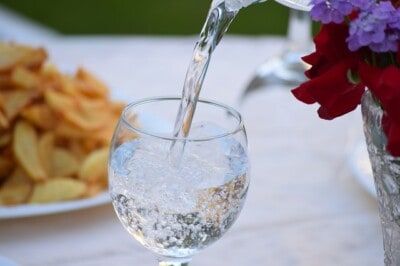Water filter – Low-pollution drinking water
Did you know that more than half of our body consists of water?? Water is a very important transport and solvent. It provides the body with nutrients and transports harmful substances out of the body. That’s why babies have a particularly high water content of 80 percent. In the womb, the water content is even higher.
Children consist of about 75 percent water and adults of about 66 percent water. For very old people, the water content is still just over 50 to 60 percent.
As you can see, the older we get, the less water we have in our bodies. Older people in particular often drink too little.
Sufficient drinking is important at any age, especially in summer when we sweat more. We also lose water through breathing and when we sleep. It is therefore important to top up with liquid from time to time.
How much water should we drink?
How high the minimum amount of water should be depends not only on sweating, but also on weight. Heavier people also need more water.
Thus, men generally need more water than women and adults more water than children. At least 0.03 liters are needed per kilogram of body weight. This means that a man weighing 80 kilograms needs at least 2.4 liters of fluid daily.
Consequences of insufficient water intake
If you fail to drink enough, you can expect unpleasant consequences such as dry mouth, watery eyes, food cravings and dry skin.
But these are not yet the most unpleasant effects of too little water intake. Joint pain, headaches, fatigue, digestive problems and lack of muscle mass are also possible consequences.
Water from the tap
People who drink tap water often do not think about what harmful substances could be contained in the water. According to the waterworks, the consumption of German tap water is harmless.
However, independent tests have revealed what tap water contains. The waterworks can not filter everything or there are too high costs.
However, the levels of hormones, drug residues, chlorine, lead and aluminum are beyond good taste. German drinking water may be one of the best, but the substances mentioned above do not belong in it.
Water filter – Different filter methods
Invisible to the naked eye, germs, viruses, toxic heavy metals, pesticides or even drug residues can be found in our drinking water.
All of this can be countered by various filtering methods, which can be found, among others, on wasserhelden.net are presented in detail with advantages and disadvantages.
It is important to note that not all water filters are the same. Depending on the system and filter technology, either only the taste is improved, or only certain substances are specifically exchanged (e.g., water, water, water).B. lime), extensively the majority of the pollutants are removed or even everything is taken out of the water. Essentially, there are three known forms:
Table jug filter
The form water filter is popularly the probably best-known way to filter water. Whereas a jug filter with a cartridge insert is more of a taste enhancer than a real water filter.
It softens the water by means of ion exchange and filters odor- and taste-forming substances such as chlorine through the application of shaken activated carbon.
Partially lead and copper is also taken out. Major disadvantages besides the poor filtering performance of these devices are the high germination potential and the frequent changing of cartridges.
Activated carbon block filter
As built-in or table-top versions, these are connected directly to the pipe or faucet. The innovative production form which presses activated carbon into block form in a sintering process enables very good retention values with regard to the most common contaminants such as heavy metals, bacteria, pesticides, chlorine, plasticizers and pharmaceuticals.
In addition, all important minerals and trace elements remain in the water.
Reverse Osmosis
Reverse osmosis uses a particularly fine membrane. This filter variant belongs to the most thorough ones, since practically only water molecules get through.
To prevent clogging, the membrane should be rinsed regularly. This type of filtration is especially useful for elevated nitrate levels, as these are also filtered, as are all minerals.
